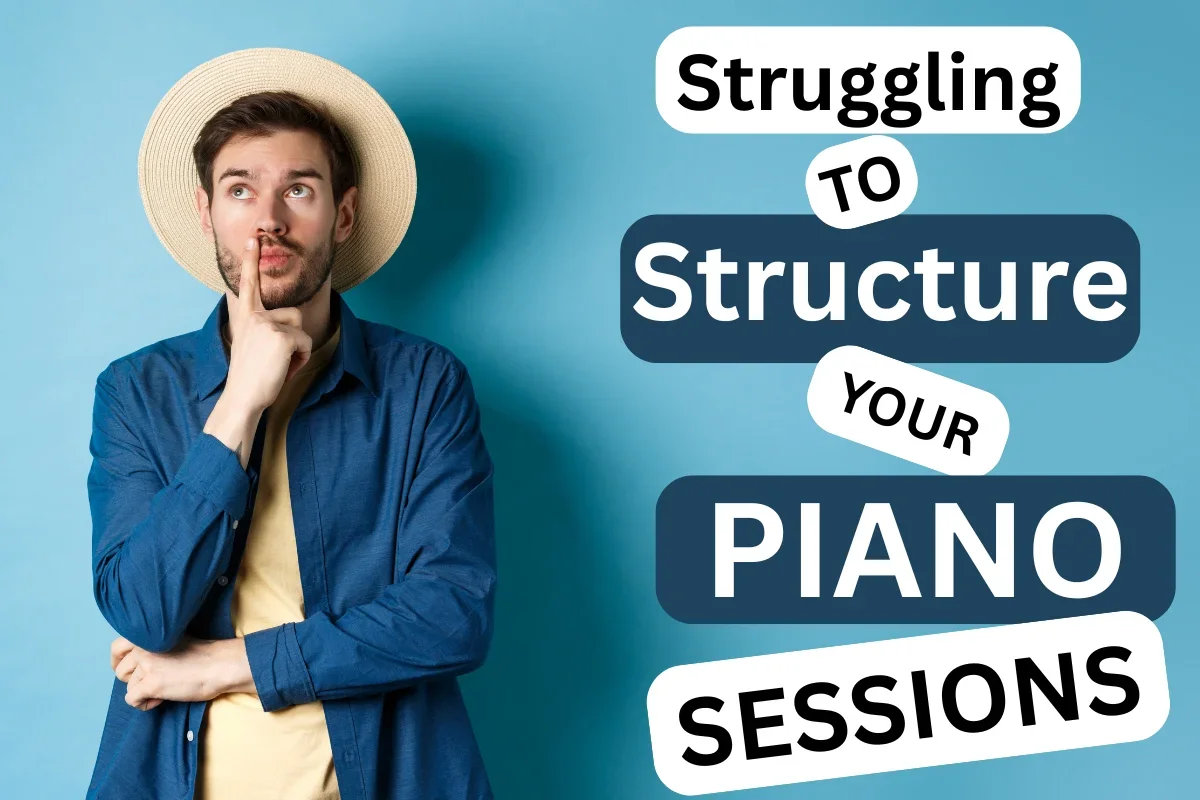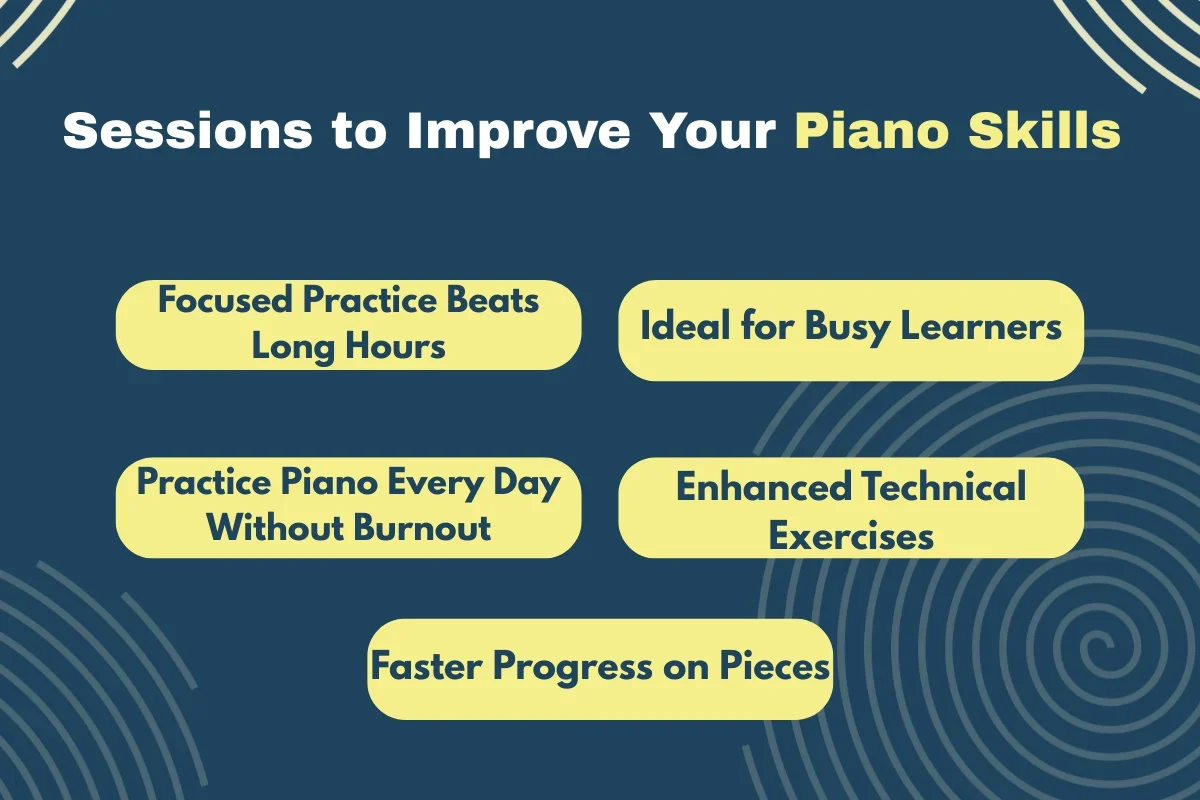How should I Structure Practice Sessions for Piano?
Ever wonder if your piano practice time is enough to make real progress?
Finding the right balance between how much and how you practice can transform your learning experience. By structuring practice sessions effectively and dedicating consistent piano practice time, learners can build muscle memory, improve technique, and play pieces more confidently.
Ready to take your piano skills to the next level? Book a private lesson at Zoom Twin Cities today and make the most of your piano practice time with expert guidance.
Start your musical journey and see real progress in every session!
How Much Should You Practice Piano Each Day?
The process of locating an appropriate time to practice piano can be a challenge, particularly among beginner piano players and adult beginners. You can train your good piano skills and muscle memory with practice every day, according to your level of skill.
Learning to play can be more effective and enjoyable, even with short and regular practice sessions on a daily basis.
Structuring Practice Sessions for Maximum Progress
Organizing your piano practice time is the key to consistent progress for piano students. Warm-ups, sight reading, technical exercises, and pieces are a way of building piano skills effectively.
A clear flow of practice helps to make learning to play the piano more enjoyable and productive.
How Short Sessions Improve Your Piano Skills Faster
The brief, intense practice sessions are effective compared to the lengthy, exhausting hours. They assist the students of the piano in developing skills effectively and strengthening muscle memory. Even short daily practice makes learning fun and burnout avoidable.
Focused Practice Beats Long Hours
Concentrated sessions with short durations enable the students of the piano to give their full attention to technique and pieces. This is a faster and more effective way of learning piano and remembering. It does not overload the learner with practice but makes it productive on a daily basis.
Ideal for Busy Learners
Despite time constraints, brief lessons can assist adult learners or children to progressively develop. The division of practice into intervals is the guarantee of technical exercises and pieces being practiced. It enables daily stress-free piano practice.
Practice Piano Every Day Without Burnout
Shorter sessions ensure that the learners are not fatigued. They develop a routine of conscious practice, strengthening the skills of the piano and musical development. In the long run, this method results in the gradual enhancement of work.
Enhanced Technical Exercises
Breaking exercises into small parts is a way to guarantee proper technique and accuracy.It trains finger independence and muscle memory effectively. Small exercises that are practiced every day enhance the general skills of the piano.
Faster Progress on Pieces
It is better to practice short parts of a piece in small bursts to enhance accuracy and musicality. It enables the learners to concentrate on tricky areas and gain confidence. This is a technique that favors gradual development in learning how to play the piano.
Building a Daily Practice Routine You’ll Actually Follow
Developing a daily routine of practice is what will enable the beginners and adult learners to learn to play the piano in a way that is not only possible but also enjoyable. With a combination of technical practices, working with sheet music, and fun pieces, you gradually develop piano skills and make the practice interesting. Daily piano practice not only helps to build muscle memory but also to build sight reading, improve technique, and enable learners to experience tangible progress over time.
Setting Specific Goals for Every Practice Session
It is also beneficial to have specific and clear goals for every practice session to keep the piano students focused and making tangible progress. Whether it is by song tutorials, technical exercises, or favorite pieces, specific objectives help practice piano daily. This method guarantees gradual mastering of the piano, muscle memory, and retention of learning, and keeps a learner motivated in the musical process.
How Sight Reading Strengthens Your Overall Piano Technique
The use of sight reading as part of the practice will assist the piano students in building up more reading skills and general technique. Daily practice with new sheet music instills confidence in music, strengthens muscle memory, and enhances the skill of playing new music correctly. Regular sight reading, whether in piano lessons or at home, contributes to the long-term development and helps a learner to improve the level of his/her skills gradually.
Practice Techniques That Make You Play the Piano Better
Applying effective practice techniques can assist the students of piano in enhancing accuracy, speed, and musical expression. The gradual practice, repetition, and mindful breaks are incorporated to guarantee the gradual skill development. These techniques prove to be particularly effective with beginner of the piano who learn to play the pieces and develop regular practicing routines.
Slow Practice for Precision
Slow practice will enable the learners to concentrate on proper finger positioning and technique. It develops muscle memory and minimizes errors in playing at full speed. Practicing slowly assists the students of the piano to play the pieces more correctly and with confidence.
Repetition for Mastery
Restating difficult parts enhances memory and builds technical competence. The gradual improvement in the skills of playing the piano is achieved through consistent repetition in practice sessions.
It renders the process of learning complex pieces manageable and effective.
Mindful Breaks to Avoid Fatigue
Short, conscious pauses will avoid hand pain and mental fatigue. Breaks assist the students of piano to stay focused and play piano on a daily basis sustainably. They endorse sustainable development without exhaustion.
Combining Techniques in Each Session
The combination of slow practice, repetition, and breaks will form a balanced routine. This methodology makes sure that every part of the piano skills is attained effectively. Students acquire technical and musical confidence.
Applying Techniques to Pieces
Apply these techniques when rehearsing popular songs or new sheet music. It enables students of piano to play musical and precise pieces. This builds up performance and general piano technique as time goes by.
The Importance of Practicing Performance Skills
Performance skills practice will assist the piano students in transitioning between studying notes and playing music confidently. Regular practice develops stage confidence, eliminates nervousness, and strengthens piano playing. This will make the learners feel ready to perform in front of people and reinforce the practice habits.
Simulate Real Performances
Practice pieces like in a recital to gain confidence. It assists the students of the piano to cope with pressure and to remain concentrated. Playing before people is not so intimidating when it is done in simulated performances.
Record and Review Sessions
Recording practice enables the learners to listen to mistakes and monitor progress. It strengthens sight reading, technique, and musical expression. Watching videos promotes personal development and practice.
Perform for Family or Friends
Performing in front of a small crowd builds comfort and performance. It develops trust and encouragement to keep on practicing every day. Students receive feedback when practicing the piano in real life.
Practice Handling Mistakes
Resilience is strengthened by learning to move on regardless of mistakes. It educates the students of piano not to panic and to remain musical. This is to prepare them for recitals, music school performances, or just home play.
Set Performance Goals
Set specific goals for every performance session, such as tempo or expression. Goals provide direction and quantifiable progress to practice. They assist the students of the piano in concentrating on skill development and enjoying playing the piano.
How Adult Beginners Can Make the Most of Limited Practice Time
Even when adult beginners have busy schedules, they can achieve a lot by engaging in brief and structured practices. An hour of practice a day, split into warm-ups, exercises, and pieces, can help to improve piano skills gradually. Regular and attentive practice enables the learners to develop muscle memory, sight-reading skills, and general technique without feeling overwhelmed.
Building Piano Skills Through Consistent, Mindful Practice
Practice is the most important aspect of long-term piano development among learners of any level.
Concentrating on routines, practical practice methods, and routines enhances the skills in playing the piano, muscle memory, and sight reading. This method is a sure way to make gradual progress, musical development, and the courage to play pieces correctly and musically, regardless of whether it is a beginner or a returning player.
Conclusion
Finding the right balance of practice time and structure is essential for piano students to make steady progress.
By setting specific goals, practicing consistently, and using effective techniques, learners can strengthen muscle memory, improve sight reading, and play pieces musically. Whether you’re a beginner or an adult learner, a mindful, well-structured practice routine ensures enjoyable, lasting growth on your piano journey.



